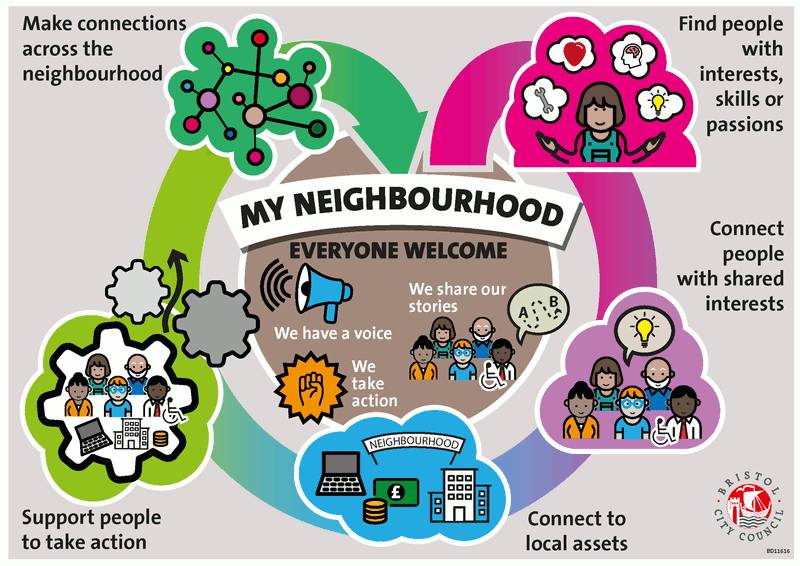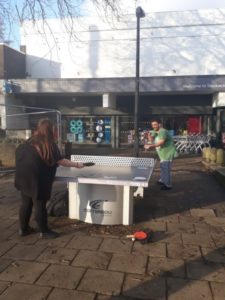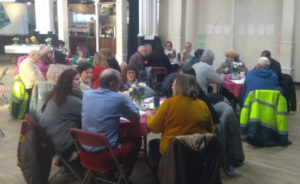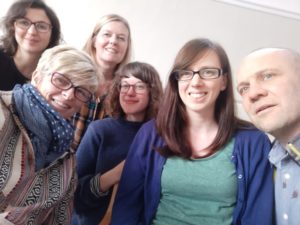
Bristol, a City of Social Action
By: Terry Black
Community Development Manager (South Bristol), Neighbourhoods and Communities Service, Bristol City Council. Facebook: Community Development Bristol, Twitter: @CommDevBristol
In Bristol we have been using an Asset Based Community Development framework in the council for four years. The community development team was part of a restructure last summer and although we lost a third of our service Bristol City Council made a continuing commitment to community development work, seeing it as being vital in supporting citizens in neighbourhoods to take action on the things they really care about and to make the lasting change they want to see (as shown in the picture above). As we know these remain challenging times of austerity and limited resources both in local government and the voluntary sector.
 Bristol has a rich history of community activism but there are neighbourhoods in the city where there is less activity than in others. What we have learnt is to encourage more social action in the neighbourhoods which face the most challenges, it takes time and continued commitment. After four years it feels we are slowly building a culture of Can-Do Bristol, across the city, where lots of small actions are creating opportunities for transformation and renewal.
Bristol has a rich history of community activism but there are neighbourhoods in the city where there is less activity than in others. What we have learnt is to encourage more social action in the neighbourhoods which face the most challenges, it takes time and continued commitment. After four years it feels we are slowly building a culture of Can-Do Bristol, across the city, where lots of small actions are creating opportunities for transformation and renewal.
In St Pauls, Tara, a local resident wanted to get the community garden up and running again as it had become overgrown and forgotten. She contacted the council parks team who cut back the overgrown vegetation and she invited people to join her from her community. After navigating the English weather, she managed to have an event and seven neighbours came and worked alongside her: “This support has brought together a great bunch of people around revitalising the Community Garden. A massive amount has been achieved in two sessions last weekend. And wonderful conversations that emerged. I love gardening for that, it was uplifting and inspiring.”. They have set up a Facebook and Whatsapp group and 20 neighbours have joined.
 Everything we do has partnership at its heart. It’s a partnership with citizens, voluntary sector partners and local businesses. We have learnt that the most effective community building is done alongside local people who want to lead it. An example of this is in Stockwood where Helen and Amanda, two residents, as well as Natalie (who is a community worker for Community Access Support Service (CASS)) held a series of community pop up events. One pop up was outside the shops where we encouraged people to play table tennis with us. Here we met Raymond, a local resident, who told us he would like to set up a table tennis club in Stockwood. Lance, the vicar, has now contacted him to offer a space to do this. This goes to show with a good understanding of local assets and a strong community network things can just get on and happen.
Everything we do has partnership at its heart. It’s a partnership with citizens, voluntary sector partners and local businesses. We have learnt that the most effective community building is done alongside local people who want to lead it. An example of this is in Stockwood where Helen and Amanda, two residents, as well as Natalie (who is a community worker for Community Access Support Service (CASS)) held a series of community pop up events. One pop up was outside the shops where we encouraged people to play table tennis with us. Here we met Raymond, a local resident, who told us he would like to set up a table tennis club in Stockwood. Lance, the vicar, has now contacted him to offer a space to do this. This goes to show with a good understanding of local assets and a strong community network things can just get on and happen.
“I have to admit although I was enthusiastic about door knocking, I was a bit apprehensive, would my neighbours think it strange? Heather (Community Development Practitioner) reassured me and out we went – the time went so quickly and everyone we encountered was lovely. The experience has made me even more motivated to do whatever I can to help ensure Stockwood is a great place to live.”
Recently Hartcliffe and Withywood Community Partnership (HWCP) were successful in their Place Based Social Action proposal to National Lottery and Department of Digital, Culture, Media and Sport (DCMS). Local people have developed a community plan called the Hartcliffe and Withywood Way which is centred on community-driven social action.
Steffan is a community development worker for HWCP and he reflects on his experiences: “Fifteen months of working in an asset based way and the learning is only beginning. Places and people are always complex and the power dynamics at play sometimes need to be experienced to be understood. The key to my work is partnership particularly with local people, who are also my neighbours. Meeting people and engaging them where they are at whilst always promoting the understanding that we are all partners. Not “professionals and amateurs” or “insiders and outsiders” but partners working towards (often unspoken) shared goals. This approach is the only way to create the vital connections that are needed but a good understanding of power and its impact is essential.”
 Antonia has been discussing some of the issues faced by people who live in Hartcliffe and she also has a passion for recycling, clothes and fashion. She was keen to do something in her community that would share her passions and support people who face daily challenges especially around their finances.
Antonia has been discussing some of the issues faced by people who live in Hartcliffe and she also has a passion for recycling, clothes and fashion. She was keen to do something in her community that would share her passions and support people who face daily challenges especially around their finances.
She had some friends with similar interests and with support, she organised the first Hartcliffe and Withywood clothes swap in September (last year) and a second event happened as part of a celebration of International Women’s Day in March. Looking forward Antonia reflected, “I wanted to bring people together. I’m also keen to encourage reuse and recycling especially when people are short of money but still want to look good. I learned that maybe it’s better to hold the event as part of a wider thing, like the women’s event as that seemed to attract more people. These are the things I’ll take into consideration when planning the next event, which will probably be towards the summer.”
 A group of residents have come together from across the city to organise learning spaces for people who are community building in their neighbourhood. They call these spaces People Power and its where like-minded people can network, share ideas and get support from each other. They have organised two events, which 70 people have attended, and another event is planned for July where community builders will share food together.
A group of residents have come together from across the city to organise learning spaces for people who are community building in their neighbourhood. They call these spaces People Power and its where like-minded people can network, share ideas and get support from each other. They have organised two events, which 70 people have attended, and another event is planned for July where community builders will share food together.
 “People Power has brought people together to have conversations and share their experiences and that’s a big achievement especially in an environment where so many of us live isolated lives. I’ve learnt there is a lot of good will but there are people like me who don’t know where to start. People Power bridges that gap by bringing people together from different experiences and backgrounds to share their approaches and this sharing is the value.”
“People Power has brought people together to have conversations and share their experiences and that’s a big achievement especially in an environment where so many of us live isolated lives. I’ve learnt there is a lot of good will but there are people like me who don’t know where to start. People Power bridges that gap by bringing people together from different experiences and backgrounds to share their approaches and this sharing is the value.”
To support this work we are creating co-produced reflective practice spaces which we call learning circles. There are four of these spaces in the city and we have over 50 people regularly attending. They are open to community development workers who want to explore and deepen their asset based practice. We are now exploring how we develop these at a neighbourhood level so we can involve local community builders.
“I found the learning circle incredibly supportive in my role. I did not have the peer support within my organisational structure so meeting with others that were using similar approaches within their work and having the chance to reflect was very welcome, I also had the chance to develop relationships with some great people.”
At the end of the day we all know this work is all about people, either as a resident or as a worker. Across Bristol there are amazing people supporting their community, doing things that they care about from hosting community building conversations, creating People Power spaces or rejuvenating green places. We are looking forward to hearing more stories of how the Hartcliffe and Withywood Way develops over the next three years and a big thank-you to all the workers who are deepening their practice and supporting Bristol residents on their journey to make their neighbourhoods an even better place to live!
Terry Black
